Reported as The Best Road Traffic Offence Lawyer in Scotland!


Charged with Speeding?
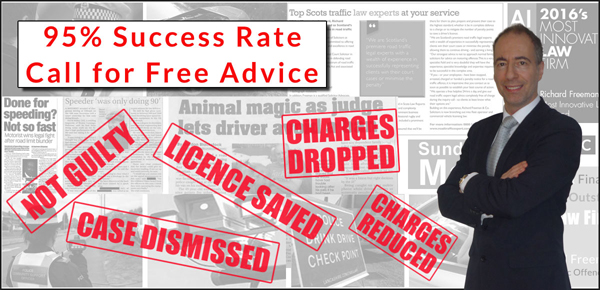
Our verifiable impressive success rate of 95% and Richard Freeman's staggering ability to win cases on often obscure road traffic legal technicalities have earned him the name Mr. Technicality. Even police officers and court Judges use Richard as their Road Traffic Lawyer!
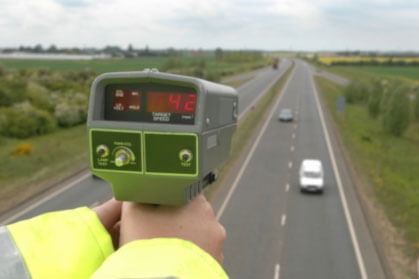
It may be VITAL to your speeding offence case that you contact us immediately. Contact us Now for FREE LEGAL ADVICE
Dial 0800 567 7810. Helpline open 24Hrs / Day
Don't risk your licence - Save It!



We are so confident in our results that we offer a 100% Money Back Guarantee based upon the agreed outcome.
Give us a call you have nothing to lose!
Click to View each Answer:
-
What are the Penalties for Speeding?Open or Close
There are various disposals available to punish speeding offences:
NON-COURT DISPOSALS
Speed Awareness Course As yet there is no speed awareness course operating in Scotland. It is the subject of debate by Police Scotland and the Scottish government but may it take some time for this to come into force.
Fixed Penalty Tickets: This punishment is only appropriate for a low end speeding offence. It takes the form of an offer from the police, and sometimes later by the Procurator Fiscal. This always consists of 3 penalty points and £100 fine and a driver has 28 days to accept it or be prosecuted in court.
COURT DISPOSALS
Prosecution in Court. These proceedings usually start by way of a citation enclosing a summons to attend the Justice of the Peace Court nearest to where the speeding offence was committed.
Penalty points: If found guilty of a speeding charge, the court can impose between 3 and 6 penalty points depending on the vehicle?s speed.
Driving Ban: It has the power to impose an outright lengthy disqualification if you are convicted of a speeding offence at a speed significantly higher than the speed limit, or if you have previous speeding convictions, including fixed penalties for speeding. The Justice of the Peace Court can, and usually will also impose a fine of up to ?1000, or ?2500 if caught on a motorway.
Totting Up Ban: If you already have penalty points on your licence within a three year period and you receive penalty points for a speeding offence, which when added together, total 12 or more, you can be disqualified under the totting up regulations for a minimum period of 6 months, unless you can establish mitigating circumstances, for example exceptional hardship.
New Driver Disqualification: If you are a new driver and accumulate 6 penalty points for speeding or other driving offences committed within the first 2 years of obtaining your driving licence, your driving licence will be automatically revoked by DVLA and you will require to resit your driving test.
There are many ways to defeat a speeding charge. We have information elsewhere in this website. If your licence or livelihood is in jeopardy, however we strongly suggest you contact us immediately on 0800 567 7810
-
What Technicalities Beat Speeding Charges?Open or Close
The good news is that the laws and procedures that apply to proving a speeding offence are extremely complex and convoluted. Only a true road traffic law expert with many years experience can exploit them to the advantage of their clients. Check out our Recent Speeding Cases.
On a daily basis we have available to us over a 100 ways of defeating a speeding charge - some are well known, some less well known, and others, which we are proud to say, significantly contribute to our unrivalled success rate, are only known to us.
Here is a short list of some basic challenges to a speeding charge.
1. The NOTICE OF INTENDED PROSECUTION (NIP) has not been served properly.
2. The correct procedure in relation to the S172 requirement has not been complied with.
3. The device used to measure the vehicle speed is defective or cannot be relied upon.
4. The device has not been deployed correctly.
5. The device has not been properly checked for accuracy or reliability.
6. The calibration certificate has expired or is otherwise defective.
7. The process after the speed has been measured has not been carried out by the police correctly or lawfully.
8. The use of the device by the police is flawed.
9. The speed limit signs fail to comply with the regulations set out in the Traffic Signs Regulations & General Directions 2002. If the signage is inadequate the court cannot convict anyone accused of speeding.
10. The speed limit imposed on the particular road is wrong. We have won a number of cases where the law creating the speed limit was wrongly drafted.
This list simply illustrates the basic issues that can, and often do, go wrong with the prosecution of a speeding case.
As Scotland's leading Road Traffic Lawyers, we have however an armoury of attacks to beat speeding charges that we would be happy to discuss with you outwith this public forum.
Suffice to say no matter what the speed is, and no matter where the court is, as Scotland's foremost Road Traffic Lawyers, we have an unbeatable success rate at winning speeding cases. -
What Types of Speed Measuring Devices Are Used? Open or Close
We frequently win speeding offence cases that to the less experienced lawyer would probably be classed as a 'no hope' case.
As expert Road Traffic Lawyers, it will come as no surprise that we have an intimate, if not obsessive knowledge, of all speeding devices used in Scotland. We have also personally operated them and are aware of all of their fallibilities.
The speeding devices can fit into certain categories:
1. Hand held Laser guns.
 Some very common examples are the UNIPAR SL 700, the Pro Laser 3 and 4, and the Ultralyte 20:20.
All such devices operate using the same process and have similar circuitry - they are hand held and fire a laser beam at an alleged speeding vehicle which locks on to a flat surface of the front or the back of the vehicle. Pulses bounces back to the device which then calculates the time and distance travelled by the targeted vehicle. The device calculates the speed of the vehicle very quickly, usually within a second, and records the speed on the digital display on the device along with the distance the beam has travelled.
Some very common examples are the UNIPAR SL 700, the Pro Laser 3 and 4, and the Ultralyte 20:20.
All such devices operate using the same process and have similar circuitry - they are hand held and fire a laser beam at an alleged speeding vehicle which locks on to a flat surface of the front or the back of the vehicle. Pulses bounces back to the device which then calculates the time and distance travelled by the targeted vehicle. The device calculates the speed of the vehicle very quickly, usually within a second, and records the speed on the digital display on the device along with the distance the beam has travelled.
The benefit to the police deploying such a device is that they can be more strategic in choosing where to position themselves to best target unsuspecting drivers. On a daily basis clients are phoning us complaining about being "ambushed" by the police who jump out from behind a bush or appear from round a corner. Very often the police can be over zealous in their bid to catch drivers to the extent that a good road traffic lawyer can successfully challenge the prosecution in court.
Although all such devices have Home Office approval, a road traffic lawyer specializing in beating speeding charges from laser guns has numerous ways in which evidence of the speed from them can be successfully attacked.
2. Mobile Camera Vans.
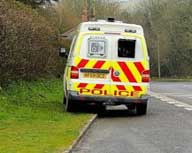 Mobile camera vans through-out Scotland are usually manned by one user, who operates an Ultralyte laser device which has a video camera attached to it in order to corroborate the speed of the targeted vehicle. It also fires a laser beam at the offending vehicle which records the speed of the vehicle and the distance from the mobile camera van.
Mobile camera vans through-out Scotland are usually manned by one user, who operates an Ultralyte laser device which has a video camera attached to it in order to corroborate the speed of the targeted vehicle. It also fires a laser beam at the offending vehicle which records the speed of the vehicle and the distance from the mobile camera van.
This device has the ability and the Home Office Approval to target a vehicle almost a kilometre away, which allows them to measure the speed of a vehicle well before the driver is aware that they are being targeted. It?s often too late when you see the van to be slamming on the brakes to bring your speed down. The operator films the whole process and stills are taken from the recording to capture the registration number of the vehicle although it is not always clear enough to identify the driver but might be clear enough to demonstrate whether it was a male or female driving it.
The police however require to use the laser device properly and show that it has been properly checked for accuracy before and after their tour of duty.
As the operator does not stop the driver at the location, he transfers all the information to their base and the administrative procedure follows with the issue of a NIP for speeding to the registered keeper along with a requirement to identify the driver of the vehicle.
3. Static Speed Camera.
 The SPECS System is an average speed camera.
This is the most modern version of a speed camera and is proliferating throughout Scotland at an alarming rate. There is an entry and exit camera which calculates the time a vehicle travels over a previously measured distance between the two cameras. Before the first cameras went live, we made it our business to fully research the operational data and how compatible the system was with with the road traffic law. It operates as a sophisticated stop watch, timing the entry and exit point between two cameras, or a series of cameras. They can be a permanent set up or used for temporary speed limits.(Richard Freeman has written an article for Glasgow Live debunking the myths of average speed cameras..
The SPECS System is an average speed camera.
This is the most modern version of a speed camera and is proliferating throughout Scotland at an alarming rate. There is an entry and exit camera which calculates the time a vehicle travels over a previously measured distance between the two cameras. Before the first cameras went live, we made it our business to fully research the operational data and how compatible the system was with with the road traffic law. It operates as a sophisticated stop watch, timing the entry and exit point between two cameras, or a series of cameras. They can be a permanent set up or used for temporary speed limits.(Richard Freeman has written an article for Glasgow Live debunking the myths of average speed cameras..
4. GATSO Cameras.
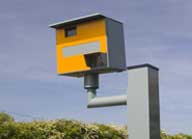
These are well known fixed speed cameras most of which have been switched from radar to laser devices. They have a camera contained within the box unit that takes two pictures over a timed distance. If you see it flash twice that is an indication that a vehicle has triggered the device. Once that happens the device can be interrogated by the police and the paper trail commences with the issue of the Notice of Intended prosecution for speeding. There are a number of unique attacks on the evidence that is led in court by the crown when trying to prove a speeding charge.
5. In Built Police Car Equipment - VASCAR: PROVIDA: PUMA: SPEEDOMETER
 The police can follow you in either a marked or unmarked police vehicle to measure your vehicle speed by using a VASCAR, PROVIDA or PUMA device fitted to their car, which calculates an average speed by measuring the distance and time over which your vehicle has travelled.
The police can follow you in either a marked or unmarked police vehicle to measure your vehicle speed by using a VASCAR, PROVIDA or PUMA device fitted to their car, which calculates an average speed by measuring the distance and time over which your vehicle has travelled.
The police can also measure your speed by pacing your vehicle while using a calibrated speedometer over a certain distance.
In these circumstances there is a multitude of rules that the police must strictly adhere to before a speeding charge will stick in court. As expert road traffic lawyers, these cases are extensively tested by us in court with very successful outcomes. -
Do I Need a Lawyer?Open or Close
It is highly advised to have the proper legal representation when fighting a road traffic offence as it is a highly specialised area of the law in Scotland. In addition to attacking the use or accuracy of a speed measuring device, a speeding case is often won by us, by robustly testing the way in which your case is prosecuted in court.
This involves testing how the evidence is presented during a trial, and scrutinising the crown case and the procedure of a particular case in court.
The Road Traffic Experts are often the subject of comment by officials in courts across Scotland that a speeding trial takes significantly longer when we defend an accused than any other lawyer! This is because we leave no stone unturned and know what we're looking to achieve when we are conducting a client's defence.
IN ORDER TO MAXIMISE YOUR CHANCE OF SUCCESS IT IS VITAL THAT YOU SPEAK TO A TRUE SCOTTISH ROAD TRAFFIC LAWYER SPECIALIST AS SOON AS POSSIBLE. MANY OF OUR STRATEGIES ARE TIME CRITICAL AND COULD BE LOST IF NOT ACTED UPON TIMEOUSLY.
AS SOON AS YOU THINK YOU MIGHT BE CAUGHT SPEEDING CONTACT US STRAIGHT AWAY AND YOU WILL RECEIVE THE BEST ADVICE FROM ONE OF OUR THREE LEADING ROAD TRAFFIC LAWYERS.
We Cover All of Scotland
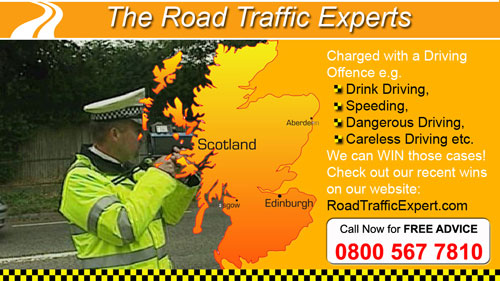
All of Scotland Covered:
Including: Glasgow Edinburgh Aberdeen Dundee Paisley Renfrewshire East Kilbride Perth Livingston Cumbernauld Hamilton Kirkcaldy Dunfermline Ayr Kinross Kilmarnock Inverness Greenock Inverclyde Port Glasgow Coatbridge North Lanarkshire Glenrothes Fife Airdrie Falkirk Stirling Rutherglen Dumfries Galloway Motherwell Wishaw Clydebank West Dunbartonshire Bearsden East Dunbartonshire Cambuslang Newton Mearns East Renfrewshire Bishopbriggs Musselburgh East Lothian Arbroath Angus Polmont Elgin Renfrew Renfrewshire Alloa Bellshill Clackmannanshire Blantyre Dumbarton West Dunbartonshire Kirkintilloch Clarkston
East Renfrewshire Bathgate West Lothian Stenhousemuir Falkirk Peterhead Aberdeenshire Barrhead
Grangemouth Falkirk St Andrews Kilwinning Ayrshire Viewpark Buckhaven Penicuik Midlothian Stranraer Johnstone Erskine Larkhall Moray


